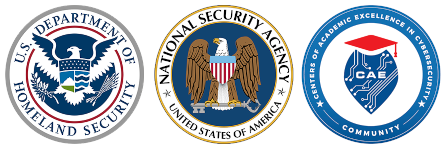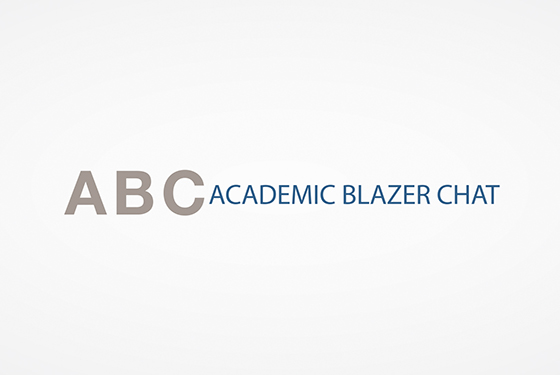
About this Program
Our program provides comprehensive education and hands-on training, preparing graduates for technical and management roles in cybersecurity.
Program Overview
Tuition & Fees
Funding Opportunities
Download Cybersecurity Brochure
The National Security Agency (NSA) and the Department of Homeland Security have designated Hood College and the Center of Computer Security & Information Assurance as a National Center of Academic Excellence in Cyber Defense Education (CAE-CDE) and a member of the CAE in Cybersecurity Community.

The MS in Cybersecurity also addresses the core subject areas and skill sets identified in the Cybersecurity Workforce Framework by the National Initiative for Cybersecurity Careers and Studies (NICCS).
The Master of Science in Cybersecurity is a 30-credit program for technical and non-technical students with a bachelor’s degree. Prior background in computing is desirable but not required to enter this program. Individuals without such a background can enter the degree program by enrolling in two prerequisite foundation courses. The program's structure allows students to enter from different disciplines, providing a common foundation and the robust subject matter training necessary in today’s cybersecurity job market.
The program provides a thorough understanding of cybersecurity's technical and managerial aspects. Graduates leave Hood ready to tackle the complex cyber challenges in business, industry, government, education, health, and other fields. For students who want cyber training but not a complete master’s degree, there is a stand-alone certificate in cybersecurity.
The Cybersecurity certificate requires five courses (three core and two electives) if the applicant has a background in computing or information technology. For applicants who do not have a computing background, the program offers a two "bridge" (foundation) courses that will prepare them to succeed in the certificate. The certificate courses and options are available in this planner.
News Flash! Hood College is ranked #13 in the Top 18 most affordable online Cybersecurity programs by Cybersecurityguide.org.
View Hood Talks Elections and Cybersecurity: Myths, Risks and Realities webinar with Dr. Dimitoglou.
Boost professional marketability
The demand for qualified cybersecurity professionals is strong. In the Washington, DC-Baltimore area alone, there are over 90,000 unfilled positions (Source: Cyberseek.org, 2023).
The Master’s in Cybersecurity is designed to prepare and train students to enter the cybersecurity workforce. The program is set up to enable partnerships with local technology companies and government organizations. Students are encouraged and supported to pursue experiential learning and research opportunities during their studies. The program culminates with a capstone thesis project with either a scholarly or applied focus linked to the needs of local industry and government partners. Students also work with faculty mentors and partners to develop relevant research and project questions; collect data, design systems, develop software, protocols, methods, and techniques; synthesize their findings or work artifacts into a final product; and present their findings to the partners and scholarly venues.
Program Outcomes and Student Learning Objectives
The Master of Science in Cybersecurity is designed with specific Program Learning Outcomes (PDF). The program is also aligned with the Hood College Graduate School Outcomes.
Explore current IT issues
The curriculum deepens knowledge of cybersecurity procedures, tools, and standards. Students learn systems and network security, computer forensics, cryptography, ethical hacking, and contemporary technologies and techniques in web, wireless, and mobile security. They also explore current trends and issues, gaining valuable insights into cybersecurity’s role and impact in day-to-day business operations.
Part-time or Full-time, On-Campus or Online
Students can complete the 30-credit program in three years by taking one or two courses a semester. As full-time students, they can take on-campus classes and graduate in 15 months. Both formats provide instruction from highly qualified faculty and adjunct instructors with proven cybersecurity experience.
The program is available in an on-campus format or entirely online. Students can choose the modality per course, providing excellent scheduling flexibility. The online access is asynchronous to accommodate students who travel or reside in different time zones.
CyberBlazers
Cybersecurity students are invited to participate in CyberBlazers, the program's ethical hacking student team. Students who join this welcoming group of students and faculty learn together, practice together, and compete in regional and national cybersecurity and capture the flag (CTF) competitions.
WiCyS Chapter
At WiCyS, a global community of women, male allies, and advocates, we are dedicated to bringing talented women together to celebrate and foster their passion and drive for cybersecurity. Join us to move the needle in women's underrepresentation in cyber! Explore the Global WiCyS Membership Benefits page.
The Cotton Cyber Lecture Series
Janet Hobbs Cotton ’59 and her husband, John Cotton, have given the new cybersecurity master’s program a generous gift by establishing the Cotton Cyber Lecture Series, bringing nationally and internationally recognized leaders in cybersecurity to campus to speak.
- Apr 05, 2018 (INAUGURAL LECTURE): General (Ret) Keith Alexander (bio), Founder and CEO, IronNet Cybersecurity
- Oct 18, 2018: Ronald S. Ross (bio), Fellow, National Institute of Standards and Technology
- Apr 09, 2019: Hector Monsegur (bio), Director of Assessment Services, Rhino Security Labs
- Oct 03, 2019: Melissa Hathaway (bio), President, Hathaway Global Strategies
- Apr 06, 2021: Kevin Stine (bio), Chief, Applied Cybersecurity Division, National Institute of Standards and Technology.
- Oct 14, 2021: Vinton G. Cerf (bio), Vice president and chief Internet evangelist for Google
Visit our Cotton Lecture Series website for more information.
*Active duty Fort Detrick soldiers are eligible for a full tuition waiver for this program or any other graduate certificate and master's program at Hood College per our special Hood/Fort Detrick MOU.
3MT Competition
Cybersecurity students are invited to present their Capstone and compete at the Graduate School's Three Minute Thesis (3MT) competition, held annually at the end of the Spring semester. We are proud of the participation of past participants:
- 2023:Khalid Alatawi | Logan Besch | Paige Langmead
- 2022:David Aidoop | Nasser Alharthi | Martin Owusu-Antwi
- 2021: Suiltan Alhajry | Ahmed Almatthmi | Patrick Burnett | Michael Calafos | Julia Downing | Hamid Ghasemi | Sanket Lange | Gastien Mbouna | Fadi Qazzazee | Harold Rivas | Mohammed Sabeeh | Seth Wilson
- 2020: Connor Brown | Rob de Cespedes | Nikhil Kalva | Luan Lepi | Jeff Whipp
- 2019: Eddie Hamad

Hood College participates in the State Authorization Reciprocity Agreements.
Admission Requirements
For students applying to the master's or certificate in cybersecurity program, please submit the following to the Graduate School:
- One copy of official transcripts from each institution attended.
- Résumé/CV that provides educational and professional experience (required only for master's program).
This program is designed for students with a background in computer science or related area that has prepared the students in core computing subjects, such as programming, computer architecture, operating systems, networking, data management systems and applications. Students who do not have the necessary background will be required to complete one or both of the foundation courses to ensure they are well prepared for the required coursework. The determination to take the foundation courses is based on a thorough evaluation of student transcripts and other supporting documents during the application review.
Transfer credit policy for admitted students
Students may transfer a maximum of 6 graduate credits from an external, accredited institution, or another Hood graduate program prior to the first semester of study in the current program. Please review the full graduate transfer credit policy in the College catalog.
Degrees Offered
- MS
Department Offering
Are you ready to go further?
The Master of Science in Cybersecurity, for students with undergraduate preparation in computer science or related area, requires the completion of 30 credits: 24 credits of core courses, one 3 credit elective course, and 3 credits of a Cybersecurity Capstone.
Students, without undergraduate preparation in computer science or related area, will be required to complete one or two foundation courses, designed to provide the appropriate background knowledge and foundation to succeed in the program.
Core Requirements
| CYBR 555 | Information Systems Security | 3.0 |
| CYBR 548 | Telecommunications & Networking | 3.0 |
| IT 530 | Applied Database Concepts | 3.0 |
| CYBR 534 | Network and Internet Security | 3.0 |
| CYBR 521 | Information Assurance & Risk Assessment | 3.0 |
| CYBR 532 | Computer Forensics | 3.0 |
| CYBR 535 | Security Policies, Ethics and Law | 3.0 |
| CYBR 556 | Ethical Hacking | 3.0 |
| CYBR 560 | Cybersecurity Capstone | 3.0 |
Elective
One from the following:
| CYBR 537 | Applied Encryption & Cryptology | 3.0 |
| CYBR 599 | Special Topics | 3.0 |
| CYBR 597 | Cybersecurity Practical Training | 1-6 |
Foundation Courses
Any foundation courses required are in addition to the 30 credits required for program completion.
| IT 510 | Computing Hardware & Software Systems | 3.0 |
| CSIT 512 | Elements of Computer Programming | 3.0 |
- Students in the Μaster's in Cybersecurity program should use this Program Planning Guide (PDF) to plan and track their progress.
- Students in the Cybersecurity Certificate program should use this Program Planning Guide (PDF) to plan and track their progress.
Admission
- How do I apply for admission?
- Students apply for admission following the directions here.
- What are the admission criteria for the program?
- You can find the admission criteria here.
- Do you offer probationary or conditional admission if I don't meet one or more of the admission criteria?
- We don't offer probationary or conditional admission. After admission, if a student’s GPA falls below 3.0, the student must restore their GPA to a 3.0 within 9 credit hours to avoid dismissal from the program. The application review is designed to ensure that admitted students will be well prepared to succeed in the program. Based on an applicant’s background, the program director may require registration in specific foundational coursework and/or limit the number of credits for enrollment during the student’s first semester.
Program
- How many courses do I need to complete for the MS in Cybersecurity?
- Students must complete 10 courses above the foundation courses (see the Program Planning Guide).
- Is the program offered part-time or full-time?
- Both. Students may study in the program either part-time or full-time.
NOTE: International students in the US with a student visa are required to be full-time.
- Both. Students may study in the program either part-time or full-time.
- Is the program offered on-campus or online?
- Both. Students may study in the program either on-campus or online.
NOTE: International students in the US with a student visa are not allowed to take any online courses.
- Both. Students may study in the program either on-campus or online.
- What is the typical course structure in the program?
- Students can expect a carefully integrated mix of lectures, hands-on laboratory assignments, computer-based simulations, individual and small group projects and discussions along with guest lectures by local cybersecurity government and industry leaders and world-renowned experts (see: Cotton Lecture Series).
- What is the typical class size?
- Most classes have an average of 14-16 students; however, there are some very popular courses that average 24 students. At Hood College, in person or online, you will never be in a class where your instructor doesn't know your name or how you are doing in class.
Courses
- What are the foundation courses?
- Foundation courses aim to help students with partial or no preparation in computing or information technology get ready to be successful in the program. There are two such courses: IT 510 Computing Hardware & Software Systems and CSIT 512 Elements of Computer Programming (Python).
- How many courses can I take each semester?
- In graduate school, three courses (9 credits) is considered a full-time load. Part-time students may take anywhere from one to three courses each semester. Full-time students must take three courses each semester. NOTE: International students are required to maintain a full-time course load in order to comply with US student visa requirements.
- Can I transfer courses from another graduate program?
- Yes. You may request to transfer up to 6 graduate credits (two courses) from another accredited institution. The courses to be transferred must have been completed with a grade of B or higher and must match course(s) in our program. The final decision to approve any transfer credits is made by the Program Director.
- Can I substitute courses in the program with other courses (e.g., CS, IT, ITMG)?
- Generally, no. Particularly if it is a core course, and therefore an accreditation requirement for our program. We may have some latitude in counting a relevant course from another computing discipline as an elective. However, to do so, the student must provide an unofficial transcript, a course syllabus, and a course description. The final decision to count such a course is made by the Program Director.
- How much time can I expect to spend on each course per week?
- On average, you will spend about three hours each week in the classroom for each course. The rule of thumb is that you should estimate spending no less than three hours per week for each hour you are in the classroom to study, do homework and work on projects.
- What are the easy courses in the program?
- All the courses are challenging in their own way. There are courses some students find more enjoyable than others, but it is subjective and mostly based on personal interests and prior background. If a student is admitted to the program, we make sure they have the right preparation to succeed.
- Do I need to always follow the course prerequisites?
- Yes, the course prerequisites have been carefully designed to meet the program's goals.
- What is the CYBR 560 Cybersecurity Capstone about?
- Read a sample syllabus (PDF) that explains the Capstone, the process, and the student responsibilities and methods of evaluation.
- What is the CYBR 599 Special Topics elective course about?
- This is a designation for courses covering specialized topics that are not taught on a regular basis. When a CYBR 599 course is offered, students will see it on the schedule along with a meaningful title describing the course.
- What is the CYBR 597 Cybersecurity Practical Training elective course about?
- This course is designed to provide cybersecurity students with a working knowledge and practical application of the topics covered in our cyber courses. Students will apply current research and accepted practices in the cybersecurity field in a variety of professional settings and will perform work supervised by both a professional adviser and a Hood adviser. Based on the description for the external position, students will craft an appropriate research/professional plan in consultation with their adviser. This course will help students synthesize previous concepts and training as they transition to the role of a professional. Students should contact the Hood College Career Center to get help with locating potential relevant positions that could be used to serve as Practical Training sites.
- Will the M.S. in Cybersecurity prepare me to obtain professional certificates?
- Our curriculum provides a comprehensive background and practical, hands-on skills to succeed in cybersecurity. Several courses (e.g., CYBR 555, CYBR 521, CYBR 566, and others) cover the same (and more in-depth) topics required by many popular certificates so our students are well prepared when they decide to pursue them. However, our courses are not designed to prepare students for a particular certificate or “teach to the test.” Students interested in a specific certificate should obtain information about the contents, criteria, and testing from the administering organization.
- Why do employers ask for professional certificates? Isn't my degree enough?
- Your degree is more than enough from the perspective of what you have learned and what you can do. But cybersecurity is a fairly new field and employers are asked to review job applications from candidates with vastly different academic preparation and experience. Professional certificates are a convenient way for employers to quickly and easily understand a job candidate's level of expertise.
- Do I need to earn professional certificates (e.g., Security+, CISSP, CEH, etc.)?
- It depends. Application requirements in the job market vary across industries and employers. There are employers that do not ask for any professional certificates for candidates holding a graduate degree in cybersecurity. Other employers hire graduate degree holders with the expectation for professional certificates to be obtained within a certain period of time while employed. There are also employers that make certificates a requirement to be even considered for a position. Your academic degree will prepare you to tackle any certificate if you begin to see employers asking for them. After you begin working in the field of cybersecurity, obtaining certificates is considered in the industry as a type of professional development, similar to attending workshops or getting training.
Assistantships/Financial Aid
- Are there any Teaching or Research Assistantships available?
- There are only a couple of assistantship (Graduate Assistant) opportunities but they are very limited and require completion of about 50% of their courses to be eligible. Assistantships are very competitive to get, and we strongly advise that no student should make any financial decision assuming that they will be selected and receive the assistantship. The reason we have limited assistantship is that we are able to keep the cost of the MS program affordable for every student in the program -- and we have one of the most affordable programs.
Registration and Logistics
- How do I register for the first semester?
- Follow these steps. The always helpful staff of the Graduate School are also always eager and ready to help!
The 4PLUS program is designed for highly motivated students who have the desire to build career options into their undergraduate curriculum and earn a master's degree in cybersecurity.
Hood College students from all majors are eligible to participate in a 4PLUS program that allows for a combined, and in some cases accelerated, master’s degree in cybersecurity after the completion of their undergraduate program. The program is especially relevant to computer science majors, but it is also available to students from other disciplines.
The Cybersecurity Capstone Thesis
The Cybersecurity Capstone is the culmination of the master's program. The Capstone invites students to develop further and demonstrate their ability to engage broadly and in-depth with a specific topic in the discipline. It draws diverse modes of learning into one focused area that can enhance the student’s informed cybersecurity practice. This learning and engagement with a specific topic are expected to be highly scholarly. Students are encouraged to begin discussing areas of interest and topics for their Capstone with potential faculty thesis advisors after completing 21 credits in the program.
The Cybersecurity Capstone Guidelines are posted on the Graduate School's site (Sec. Final Thesis, Projects, Capstones and Research, Departmental Guidelines).
The following are the titles of past Cybersecurity Capstone Projects.
Note: Because the work may have been conducted in an industry or a government setting, or it is based on private or internal, company-sponsored research, copies of the capstone projects are not made available. It is the author's prerogative to decide if they will share their project, and you must contact them directly to request a copy. Neither the Program, the Department, nor the College can provide former students' contact information.
2024
- Abed, K., "Analysis and Visualization of Attack Signatures from Honeypots"
- Albukhari, B., "Cost of Security by Design"
- Alshehri, A., "Network Stress Test & Visualization Simulator"
- Alothman, M., "A Comparative Analysis of Firewalls: Traditional vs. Next-Generation Firewalls (NGFWs)"
- Amoah, E., "Comparative Analysis of Machine Learning Algorithms for Cyber Fraud Detection"
- Bojja, N., "Secure Software Development in the Agile Software Development Lifecycle"
- Chekuri, P., "Exploration of Cryptographically secure Pseudo Random Number Generation for Symmetric Encryption"
- Gottumukkala, M. V., "Implementation of a local, secure DNS Server"
- Greene, S.A., "Risk Management and Cybersecurity Insurance"
- Hanna, M., "Child Sexual Abuse Material Detection Systems"
- Kumar, J.,"Comparative Analysis of Convolutional Neural Networks in Regards to Deepfake Detection"
- Urban, J., "A Comparative Analysis of Data Privacy-Preserving Methods for Sharing Protected Health Information"
2023
- Adetona, A. O., "Threat Analysis and Visualization of Common Vulnerabilities and Exposures (CVE) Data"
- Alqahtani, R., "A System for the Prevention of SQL Injection Attacks"
- Babaei, A., "Cloud-Based Infrastructure as Code (IaC) Security Framework: Strategies for Identification, Mitigation, and Maintenance of Configuration"
- Besch, L., "Survey and Classification of Social Engineering Attacks"
- Chandula, I.R., "Development and Analysis of a Machine Learning Intrusion Detection System"
- Gaddam, R., "Unauthorized User Access Detection Based on Mouse Dynamics"
- Kutey, A., "Comparative Analysis for Security Architecture Framework"
- Langmead, P., "Comparative Evaluation of Cybersecurity Certifications (CMMC and ISO 27001)"
- Malipeddi, S., "Routing Summarization for Firewall and Network Perimeter Protection"
- Owusu-Antwi, M., "Cost-benefit Analysis of Security by Design"
- Sarangal, H., "Plagiarism Detection Systems and Privacy: Balancing Academic Integrity and User Data Protection"
- Wyld, D., "Cybersecurity Governance & Compliance: Mitigating Risk In Telehealth Smart Home Integration"
2022
- D. Aidoo, "Analysis and Comparative Performance of Open-Source Intrusion Detection Systems"
- K. Alatawi, "Cybersecurity Insurance and Risk"
- N. Alharthi, "Comparative Malware Analysis of Ransomware"
- S. Alqatani, "Comparative Analysis and Criteria for Evaluating Ransomware Malware"
- B. Felts, "Cyber Security Risk Quantification Based on Limited or Unknown Information"
2021
- S. J. Alhajry, "Comparison of Malware Detection Techniques"
- A.M. Almatthmi, "Evaluation of User Interfaces in Security Information and Event Management Systems"
- P. Burnett, "Cybersecurity Maturity Assessment for Identification and Remediation of Insider Threats"
- M. Calafos, "The Dark Side of Cryptocurrency: Laundering Money and Financing Criminality"
- J. M. Downing, "The Implications of Huawei 5G on the Five Eyes Intelligence Sharing Alliance"
- S. Lange, "Development of Automated Penetration Testing Tool with Push Notifications"
- M. D. Sabeeh, "A Survey on the State of Bots, Associated Threats, and Detection Techniques"
- G. Mbouna, "Internet-based Voting Security: The Case of the African Continent Transitioning to E-voting"
- F. F. Qazzazee, "Comparison and Performance Evaluation of VPN Technologies"
2020
- F.Y. Aljammaz, "A Comparative Analysis of Threat and Risk Modeling of Consumer IoT Devices"
- A. Alzahrani, "Detection and Prediction of Insider Threats"
- C. Carrington, "Evaluation and Comparison of Cyber vs. Non-Crime and Punishment in the Criminal Justice System"
- J. Flagg, "Impact and Risk Evaluation of Medical Equipment on The Security Posture of Healthcare Organizations"
- H. Rivas, "Security and Risk Evaluation of Cloud Storage and Cloud Infrastructure"
- S. Wilson, "Evaluation of the Cybersecurity Posture in Emergency Services Organizations"
- A. J. Woodring, "E-Voting Platforms: Are They Secure?"
- A. Abdulmajeed, "Threat Analysis of E-voting"
- N. Alosaimi, "Vulnerability Analysis of Smart Contracts"
- C. Brown, "The Dilemma, Ethics, and Impact of Responsible Disclosure"
- R. de Cespedes, "Security Operations Center (SOC) Threat Visualization"
- H. Ghasemi, "Reducing Crime Related to Cryptocurrency Transactions"
- N. Kalva, "Framework for the Evaluation of Privacy in IoT Devices"
- L. Lepi, "A Comprehensive Survey of Threat Modeling Techniques and Their Applied Uses"
- J. Whipp, "Enterprise Cybersecurity Plans, Policies, and Procedures"
2019
- A. Olanrewaju, "Establishment of a Security Operations Center (SOC)"
- S. Soni, "Protection by adversaries while using TheOnionRouter(TOR)"
- F. Alamri, "Threat and Risk Modeling for IoT Device(s)"
- F. Alatawi, "Best practices in defending against DDoS Attacks"
- O. Aloufi, "Measuring Security"
2018
- A. Alsenaidi, "Cyber Security and the 4th Industrial Revolution"
- D. Hill, "Retaliation to cyber attacks. Should the US respond to cyberattacks by national adversaries?"
- J. Brewer, III, "Vehicle/Automotive Hacking"
- M. Giambruno, "Do Smart Houses Make for Safe Homes?"
- E. Hamad, "Development of a Firewall with Randomly Generated Service Ports"
- S. Jewett, "Cyberwafare, Cyber Weapons, and Cyber Attacks"
- P. Abayomi, "User interface for server firewall management
Additional Information
9-24 Months
Average Completion Time
33 Total Credits
Program Contact

Program Director

Assistant Director of Graduate Admission

Online Programs Launch in Cybersecurity and Information Technology
FREDERICK, Maryland—Hood College has launched online programs in cybersecurity and information technology to make these programs more accessible for working professionals. Cybersecurity and information technology are ever-growing industries in the Maryland and Washington, D.C., region that need qualified workforces. According…

Graduate Student Spotlight | Julian Urban '23
"One of the main reasons why I chose to come to Hood was the small class sizes. I like that my professors can get to know me and are more accessible when I need help."
Graduate Alumni Spotlight | Sanket Lange, M.S.’21
“Hood College was very close to my house and had a good reputation, so I chose to study here.”

Graduate Alumni Spotlight | Sneha Soni, M.S.’20
“To me, Hood College is one of the best colleges in the U.S., and it provides all kinds of unique experiences to the student. The faculty, students and other staff members are very helpful and friendly. Hood is a place that gives equal chances to every student to enhance their knowledge and personal development.”






